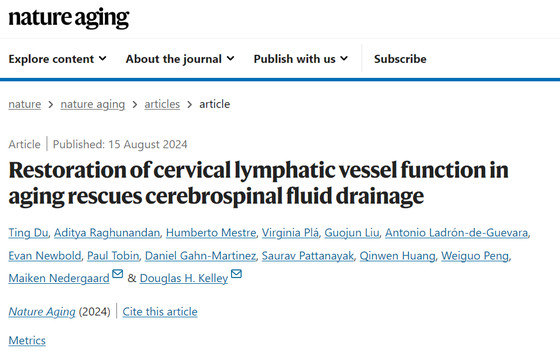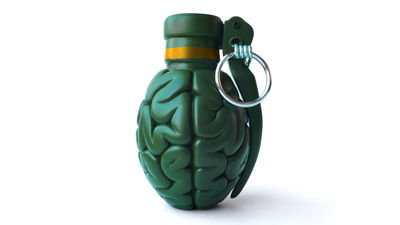A new treatment will be developed to improve the aging of the brain's waste disposal system, which causes Alzheimer's disease

One of the causes of various dementia diseases such as Alzheimer's disease is the accumulation of a substance called ' tau protein ' in the brain. This tau protein is removed by the glial lymphatic system , which is the brain's waste removal system, but it is known that as aging progresses, this glial lymphatic system stops functioning, causing cognitive impairment. A research team from the University of Rochester Medical Center has announced a treatment to improve the glial lymphatic system, which has stopped functioning due to aging.
Restoration of cervical lymphatic vessel function in aging rescues cerebrospinal fluid drainage | Nature Aging
https://www.nature.com/articles/s43587-024-00691-3

Cleaning up the aging brain: Scientists restore brain's trash disposal system | ScienceDaily
https://www.sciencedaily.com/releases/2024/08/240815124156.htm
The glial-lymphatic system uses cerebrospinal fluid (CSF) to flush out tau proteins that neurons and other brain cells produce during normal activity. In healthy, young brains, this system is able to effectively remove toxic tau proteins, but as we age, its function declines, increasing the risk of neurodegenerative diseases such as Alzheimer's and Parkinson's.

The team used a combination of advanced imaging and particle tracking techniques to closely observe the path of cerebrospinal fluid as it leaves the brain, focusing in particular on its path through lymphatic vessels in the neck, where they were able to observe and record the pulsation of the lymphatic vessels.
Lymphatic vessels are made up of functional units called 'lymphatic segments,' which are connected together to form lymphatic vessels. The researchers found that as mice aged, these segments contracted less frequently, causing their valves to function less well. As a result, the flow of cerebrospinal fluid from the brains of old mice was 63% slower than that of young mice.
To solve this problem, the team turned to a drug called prostaglandin F2α , which promotes smooth muscle contraction and is used to induce labor. Because lymph nodes are made up of smooth muscle cells, the researchers administered prostaglandin F2α to the cervical lymphatic vessels of old mice.
As a result, the lymph nodes contracted more frequently and the flow of cerebrospinal fluid from the brain was restored to levels similar to that of young mice, suggesting that they were able to reverse the effects of aging and restore the brain's waste clearance processes.

The research team states that these findings suggest the possibility of a new therapeutic approach for neurodegenerative diseases such as Alzheimer's and Parkinson's disease, and that the use of drugs that are already in clinical use is particularly promising as a future treatment strategy.
The research team also hopes to advance research to apply this discovery to humans, and that by combining this method with other treatments, it could lead to the development of effective treatments for diseases caused by the accumulation of tau protein, including Alzheimer's disease.
Related Posts:
in Science, Posted by log1i_yk







